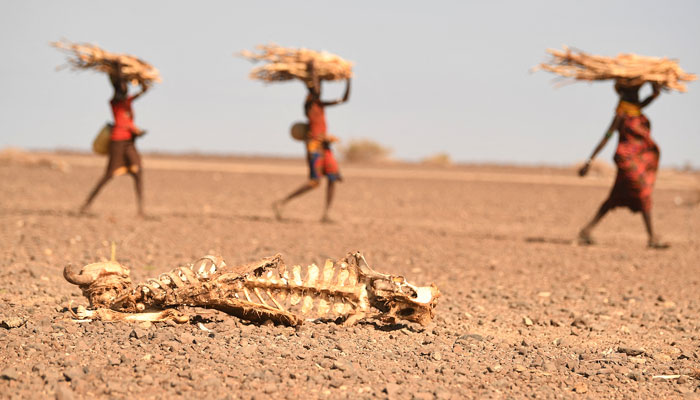Burning planet
The new wave of development has made more countries adopt policies that are not climate-friendly
Years of neglect and a lack of willingness to do something about the climate threat have now created an inescapable situation where unprecedented levels of heat are slowly becoming the norm. Last year, 2023 became the hottest year in history. Now, 2024, according to reports by the UN, is all set to break the record. The UN has warned that massive heatwaves across East Asia and the Pacific can place millions of children at risk. Over 243 million children across the two regions are estimated to be affected by soaring temperatures, according to data provided by Unicef. In the first weeks of April alone, temperatures in several countries, including Thailand and the Philippines, have already crossed the 40-degree mark. Unicef also says that soaring temperatures are a lethal threat for children. That a change in temperature patterns is more likely to affect children is true. In Pakistan, we recently saw how a severe wave of cold affected children with deadly pneumonia, with dozens of deaths reported in Punjab, where the cold was more severe. The 2015 heatwaves will forever be a reminder of the dangerous turn climatic events could take. In that year, at least 1,000 people, including adults and children, died because of a devastating heatwave.
It is rather surprising that even though the effects of climate change are more visible than ever, countries have been slow to take meaningful action to mitigate the impact of this global phenomenon. The new wave of development has made more countries adopt policies that are not climate-friendly. The cutting down of trees and green lands to make way for air-conditioned concrete jungles is a recipe for disaster, and yet no country considers changing course. In Pakistan, too, fertile lands are being razed to set up housing societies. The country’s rising population now demands low-cost, small houses with no separate space for house plants and trees. Our lifestyle habits have to change if we are to fight against the climate threat. Otherwise, we should be prepared for sweltering heatwaves for months.
The latest spell of winter, where most countries recorded less than the average temperature, hints at changing weather patterns. The health of the planet is beneficial for all of us. The development race should not blind countries to the impact their actions have on the planet. It is time the world seriously considered changing its ways and working towards improving the planet’s health. Pledges made at climate conferences are not enough. Countries have to invest in firms producing sustainable products to deal with the climate threat. While the world’s 1.0 per cent may think that fully equipped bunkers can save them from the climate catastrophe, the reality is just the opposite. The effects of climate change are more visible in developing countries because these regions do not have the protective layers that rich nations do. But the insanity of changing climate patterns shows that the developed world will not remain immune to the growing threat of climate change. It is time to act.
-
 Tucker Carlson Says Passport Seized, Staff Member Questioned At Israel Airport
Tucker Carlson Says Passport Seized, Staff Member Questioned At Israel Airport -
 Taylor Swift Made Sure Jodie Turner-Smith's Little Girl Had A Special Day On 'Opalite' Music Video Set
Taylor Swift Made Sure Jodie Turner-Smith's Little Girl Had A Special Day On 'Opalite' Music Video Set -
 Eric Dane Says Touching Goodbye To Daughters Billie And Georgia In New Netflix Documentary
Eric Dane Says Touching Goodbye To Daughters Billie And Georgia In New Netflix Documentary -
 Channing Tatum Reveals What He Told Daughter After Violent Incident At School
Channing Tatum Reveals What He Told Daughter After Violent Incident At School -
 King Charles Lands In The Line Of Fire Because Of Andrew Mountbatten-Windsor
King Charles Lands In The Line Of Fire Because Of Andrew Mountbatten-Windsor -
 Denise Richards Doubles Down On Abuse Claims Against Ex Husband Aaron Phypers Amid Show Return
Denise Richards Doubles Down On Abuse Claims Against Ex Husband Aaron Phypers Amid Show Return -
 Russia Set To Block Overseas Crypto Exchanges In Sweeping Crackdown
Russia Set To Block Overseas Crypto Exchanges In Sweeping Crackdown -
 Gwyneth Paltrow Reveals Deep Personal Connection With Kate Hudson
Gwyneth Paltrow Reveals Deep Personal Connection With Kate Hudson -
 Prince Harry, Meghan Markle’s Game Plan For Beatrice, Eugenie: ‘Extra Popcorn For This Disaster’
Prince Harry, Meghan Markle’s Game Plan For Beatrice, Eugenie: ‘Extra Popcorn For This Disaster’ -
 OpenAI To Rollout AI Powered Smart Speakers By 2027
OpenAI To Rollout AI Powered Smart Speakers By 2027 -
 Is Dakota Johnsons Dating Younger Pop Star After Breakup With Coldplay Frontman Chris Martin?
Is Dakota Johnsons Dating Younger Pop Star After Breakup With Coldplay Frontman Chris Martin? -
 Hilary Duff Tears Up Talking About Estranged Sister Haylie Duff
Hilary Duff Tears Up Talking About Estranged Sister Haylie Duff -
 US Supreme Court Strikes Down Trump’s Global Tariffs As 'unlawful'
US Supreme Court Strikes Down Trump’s Global Tariffs As 'unlawful' -
 Kelly Clarkson Explains Decision To Quit 'The Kelly Clarkson Show'
Kelly Clarkson Explains Decision To Quit 'The Kelly Clarkson Show' -
 Inside Hilary Duff's Supportive Marriage With Husband Matthew Koma Amid New Album Release
Inside Hilary Duff's Supportive Marriage With Husband Matthew Koma Amid New Album Release -
 Daniel Radcliffe Admits To Being Self Conscious While Filming 'Harry Potter' In Late Teens
Daniel Radcliffe Admits To Being Self Conscious While Filming 'Harry Potter' In Late Teens




